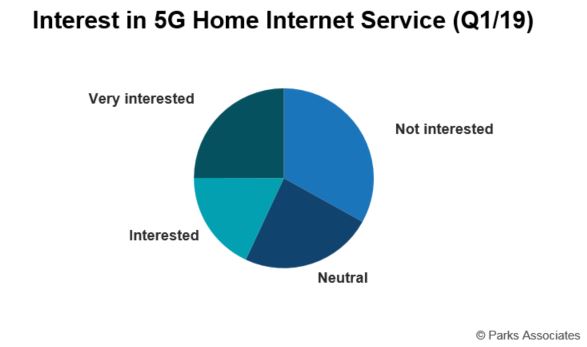5G Has Arrived, But Widespread Adoption Remains Years Away
After years of waiting and planning, the era of 5G has arrived. Within the past 12 months, all four of the major US mobile service providers (AT&T, T-Mobile, Sprint & Verizon) have introduced services. European operators introduced services in countries including Germany, Italy, Spain and the UK and South Korea rolled out 5G services in April. Throughout the globe, carriers have announced plans to have 5G networks operational by the end of 2019 or early 2020.
5G has long been promoted as a game-changing technology for consumers and enterprise services, with the ability to exponentially increase the speed and coverage of wireless networks. Running up to 100 times faster than typical cellular connections, 5G is being positioned as the next evolution in mobile services and as a replacement for fixed line connectivity as well.
However, consumer 5G awareness remains low as mobile service providers have just recently begun to market their 5G rollouts. Recent Parks Associates research reports than almost 50% of US broadband households are unfamiliar with 5G. Widening service availability and accompanying marketing programs will significantly raise awareness levels over the next few years. After being provided a description of 5G services, close to half of broadband households surveyed expressed interest in replacing their fixed line internet service with 5G home services.
Despite this interest, most US consumers will not subscribe to 5G services anytime soon. Availability remains limited, with US mobile providers offering services in just 30 cities but with plans to launch in under 50 by the end of 2020. In order to maximize the short reach of high-band frequencies, carriers are limiting coverage within these markets to specific locations in high density urban areas. Mobile providers are likely to follow this model for future launches, delaying the arrival of residential services in larger metro or suburban areas.
Many consumers living within these select markets will find also the price of 5G service cost prohibitive. Carriers are reserving 5G service for subscribers of their higher tired plans, with Verizon charging an additional $10 5G fee. Parks Associates research has found that few consumers are willing to pay a premium in order to upgrade to 5G.
Hardware availability and pricing also present challenge. Few 5G devices have been introduced as manufactures including Apple are waiting for the market to mature before investing in a large 5G phone product line. The majority of 5G phones on the market are priced towards the higher end of the spectrum, costing $200 to $300 more than equivalent non-5G models. Complicating the situation, carriers are adopting their own 5G standards, limiting current 5G phones to work exclusively on each carrier's network. Consumers are likely to be hesitant to buy such limited devices, decreasing demand and extending the period before which manufactures are willing to expand their portfolio of 5G devices.
Parks Associates' Technology Market Assessment - 5G Services provides more insight on the state of the 5G marketplace and current consumer attitudes towards this emerging technology.
Further Reading:
- 22% of US broadband households have a Wi-Fi network extender and 11% have a Wi-Fi mesh networking product
- What Shifting Data Use Means for Pay-TV and Video Services
- Modern Broadband: Competition and Retention at Gigabit Speeds
Next: AT&T’s WarnerMedia Places Max Bets on Upcoming SVOD
Previous: Content Remains the Ultimate Deciding Factor for Consumers
Comments
-
Be the first to leave a comment.
Post a Comment
Have a comment? Login or create an account to start a discussion.



